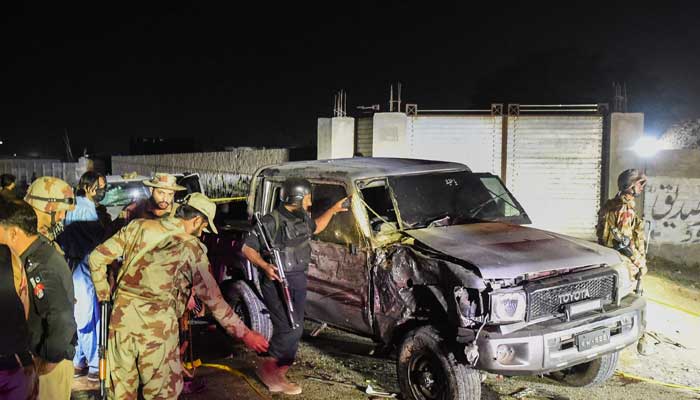
Quetta suicide blast has claimed 15 lives after an explosion ripped through a busy area near Sariab Road during a Balochistan National Party (BNP) rally. The deadly attack has deepened fears in the province, already on high alert due to increasing terror incidents. Officials confirmed that dozens were injured and investigations are underway to track down those behind the assault.
Rising Death Toll
Balochistan Health Minister Bakht Muhammad Kakar reported that 15 people lost their lives in the attack. Out of the 38 injured, eight remain in treatment at the trauma center, while several are still in critical condition. An investigation committee has been formed to probe the incident and determine how the bomber managed to strike despite heavy security.
The suicide bomber, believed to be under 30 years old, detonated explosives in a crowded area after failing to reach the main venue of the rally due to strict security checks. Authorities said the blast occurred about 45 minutes after the political gathering had ended.
Read: Rawalpindi Principal Arrested in Rape and Abortion Case
Government Response
President Asif Ali Zardari and Prime Minister Shehbaz Sharif condemned the attack in strong terms. The president expressed solidarity with the bereaved families and instructed officials to ensure the best medical treatment for survivors. He also called for a comprehensive investigation to bring those responsible to justice.
PM Shehbaz described the attack as “cowardly and condemnable,” stressing that terrorists aim to destabilize peace and development in Balochistan. He vowed that Pakistan’s fight against terrorism would continue until the threat was eliminated.
Case Registered Under Anti-Terror Laws
The Counter-Terrorism Department (CTD) confirmed that a case has been registered against unidentified individuals. The charges include murder, attempted murder, and violations under anti-terrorism laws. Investigators recovered the remains of the bomber and plan to send them for forensic analysis.
Officials noted that the BNP rally had been under threat warnings. Despite repeated alerts, pressure from organizers led to permission being granted. Security officials said around 120 policemen had been deployed to protect the gathering.
Background of Rising Violence
This attack comes amid a surge in terrorist incidents across Balochistan and Khyber Pakhtunkhwa. According to the Pakistan Institute for Conflict and Security Studies (PICSS), Pakistan suffered 78 terrorist attacks in June alone. These resulted in more than 100 deaths, including 53 security personnel and 39 civilians.
The report also recorded 189 injuries, the majority of them among security forces. Overall, violence and operations that month left 175 people dead nationwide. The figures underscore the growing scale of violence despite intensified counter-terrorism operations.
Details of the Explosion
Additional Chief Secretary (Home) Hamza Shafqaat briefed the media that eight kilograms of explosives were used in the suicide attack. He noted that the explosion would have caused far greater destruction if the bomber had reached the main rally grounds.
Shafqaat explained that the BNP rally was originally allowed to proceed at 3 pm but continued until 9 pm when the attack took place. He said organizers were repeatedly warned to end the rally on time. “The security threat issued by the administration should have been taken seriously. If the warnings were followed, this tragedy could have been avoided,” he added.
Fresh Security Threats
Officials have revealed that at least 22 suspected individuals recently entered Balochistan, and some of them may be suicide bombers. Intelligence agencies are working to identify and track these individuals.
Shafqaat emphasized that the government would now enforce stricter rules. No political rallies or public gatherings will be allowed after sundown. He also noted a specific threat alert for the upcoming 12th of Rabi ul Awwal, when large religious gatherings are expected.
Impact on Security Policy
The Quetta suicide blast has forced authorities to rethink security protocols. Shafqaat reminded reporters that while more than 100 people were killed in Balochistan in August 2024, this year’s casualty figures had shown some improvement until the latest incident.
He also assured the media that senior officials remain unharmed and that efforts are ongoing to rescue missing officers, including the assistant commissioner of Ziarat.
Terrorism in Focus
Security experts warn that suicide bombings remain one of the most difficult forms of terrorism to prevent. While checkpoints, police deployment, and intelligence sharing can reduce risk, once a bomber reaches a crowded area, casualties become inevitable.
The BNP rally attack highlights the complex security environment in Balochistan, where political activities, religious events, and even routine gatherings face growing threats. The government insists it will tighten controls, but critics argue that weak coordination between organizers and law enforcement continues to leave gaps for terrorists to exploit.
Follow us on Instagram, YouTube, Facebook,, X and TikTok for latest updates
